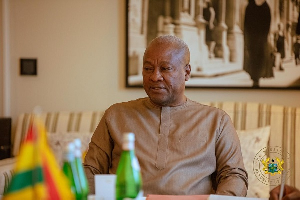The ongoing environmental degradation caused by illegal mining, commonly referred to as galamsey, has reached a critical juncture in Ghana. It has morphed into a national crisis that requires immediate and strategic intervention from all sectors, including the government, traditional leaders, and citizens. Galamsey not only threatens the country’s precious natural resources but also undermines the health and livelihoods of millions. Parliament must take a nationalistic approach to address this issue head-on.
The Role of Parliament in Addressing Galamsey: It is imperative that parliamentarians approach the illegal mining crisis with a sense of national duty, rising above political affiliations. This is not a partisan issue but a national emergency that threatens the entire population. Legislators must focus on passing stringent laws that will regulate mining practices, safeguard the environment, and penalize violators. Existing legislation may require reinforcement, and new laws should be drafted to ensure more rigorous monitoring and enforcement of sustainable mining practices.
Strengthening Environmental and Mining Laws: The laws regulating the mining sector need urgent reform. Current penalties for illegal mining activities, including the destruction of water bodies, forests, and farmland, are too lenient to serve as effective deterrents. Parliament must enact stricter penalties, including heavy fines, lengthy imprisonment, and permanent revocation of mining licenses for those found guilty of illegal mining operations. A clear legal framework is required to restore control over mining activities, particularly in regions where galamsey is rampant.
Moreover, water bodies such as the Pra, Ankobra, and Birim rivers, which have been severely polluted by illegal mining activities, must be protected by law. Parliament must also mandate the rehabilitation of these ecosystems, ensuring that mining companies, both legal and illegal, are held accountable for environmental restoration efforts.
Empowering Traditional Authorities: Ghana's traditional leaders, especially chiefs, play a crucial role in managing the affairs of communities where galamsey activities are most prevalent. Often, these areas are under the jurisdiction of local chiefs who have the ability to influence and enforce local norms and regulations. Unfortunately, in some cases, these chiefs have been sidelined or ignored in the enforcement of mining regulations. To address this, the government must strengthen the roles and authority of traditional leaders, ensuring they are key stakeholders in managing the environmental and social impacts of mining within their communities.
By working in collaboration with local governments and security forces, chiefs can take a leading role in ensuring that their lands are protected from exploitation. However, for this to succeed, traditional authority must be depoliticized. Galamsey is not an issue to be used as political leverage; it is a matter of survival for local communities and the country as a whole. Therefore, the involvement of traditional leaders must be anchored in transparent and non-partisan policies.
Depoliticizing the Galamsey Crisis: One of the most critical aspects of tackling the galamsey issue is the need to avoid politicizing it. The environmental crisis caused by illegal mining transcends political affiliations, and framing it as a political issue has only delayed solutions. Leaders across the political divide must unite in a nationalistic effort to combat this menace. Cooperation between the ruling government and opposition parties is essential in crafting long-term strategies and implementing effective measures to end illegal mining and its devastating effects.
The Role of Security Forces: Security consultant Nana Kweku Ofori Atta has stressed the importance of involving all political parties in the fight against galamsey. The involvement of security forces, such as the Ghana Police Service and military, is also essential in enforcing the laws and protecting Ghana's natural resources. However, these efforts must be coordinated and sustained, avoiding instances where political interests lead to selective enforcement.
In order to bolster the protection of water bodies and natural resources, security forces should be provided with adequate resources, training, and legal backing to effectively combat illegal mining activities. A well-organized security architecture that includes regular patrols and intelligence gathering must be established to monitor regions prone to illegal mining activities.
A Call to Action: The galamsey crisis is a national issue that demands immediate and decisive action. Parliament, working in tandem with traditional authorities and the security forces, must take a nationalistic approach to tackle this problem. This will require the passing of stricter laws, the depoliticization of the issue, and empowering chiefs to take on a more significant role in safeguarding their communities. If these steps are not taken, the environmental, social, and economic costs will continue to mount, placing the future of the nation in jeopardy.
Opinions of Sunday, 8 September 2024
Columnist: Nana Kweku Ofori Atta



















